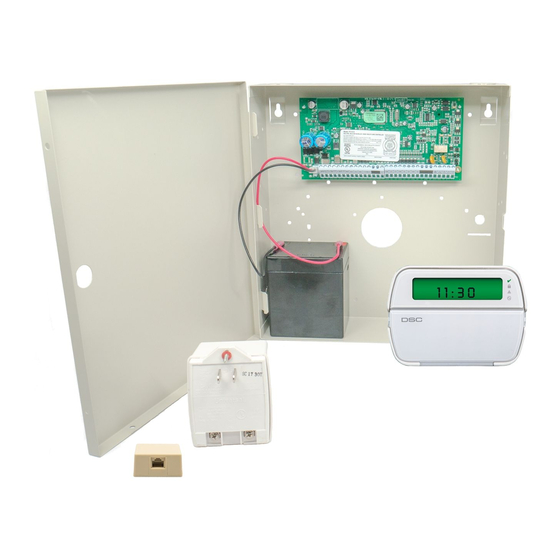DSC PowerSeries PC1864 Manual de instalación - Página 7
Navegue en línea o descargue pdf Manual de instalación para Control Panel DSC PowerSeries PC1864. DSC PowerSeries PC1864 13 páginas. System
enhancement
module
También para DSC PowerSeries PC1864: Manual de instalación (17 páginas), Manual de instalación (20 páginas), Manual (18 páginas)

Locating Detectors and Escape Plan
The following information is for general guidance only and it is recommended that local fire codes and regulations be consulted when locating and installing smoke
and CO alarms.
Smoke Detectors
Research has shown that all hostile fires in homes generate smoke to a greater or lesser extent. Experiments with typical fires in homes indicate that detectable
quantities of smoke precede detectable levels of heat in most cases. For these reasons, smoke alarms should be installed outside of each sleeping area and on each
storey of the home.
The following information is for general guidance only and it is recommended that local fire codes and regulations be consulted when locating and installing smoke
alarms.
It is recommended that additional smoke alarms beyond those required for minimum protection be installed. Additional areas that should be protected include: the
basement; bedrooms, especially where smokers sleep; dining rooms; furnace and utility rooms; and any hallways not protected by the required units. On smooth
ceilings, detectors may be spaced 9.1m (30 feet) apart as a guide. Other spacing may be required depending on ceiling height, air movement, the presence of joists,
uninsulated ceilings, etc. Consult National Fire Alarm Code NFPA 72, CAN/ULC-S553-02 or other appropriate national standards for installation recommendations.
• Do not locate smoke detectors at the top of peaked or gabled ceilings; the dead air space in these locations may prevent the unit from detecting smoke.
• Avoid areas with turbulent air flow, such as near doors, fans or windows. Rapid air movement around the detector may prevent smoke from entering the unit.
• Do not locate detectors in areas of high humidity.
• Do not locate detectors in areas where the temperature rises above 38ºC (100ºF) or falls below 5ºC (41ºF).
• Smoke detectors should always be installed in USA in accordance with Chapter 11 of NFPA 72, the National Fire Alarm Code: 11.5.1.1.
Where required by applicable laws, codes, or standards for a specific type of occupancy, approved single- and multiple-station smoke alarms shall be installed as
follows:
1. In all sleeping rooms and guest rooms.
2. Outside of each separate dwelling unit sleeping area, within 6.4 m (21 ft) of any door to a sleeping room, the distance measured along a path of travel.
3. On every level of a dwelling unit, including basements.
4. On every level of a residential board and care occupancy (small facility), including basements and excluding crawl spaces and unfinished attics.
5. In the living area(s) of a guest suite.
6. In the living area(s) of a residential board and care occupancy (small facility).
Figure 1
Figure 3a
Carbon Monoxide Detectors
Carbon monoxide is colorless, odorless, tasteless, and very
before a potentially harmful level is reached. The human body is most vulnerable to the effects of CO gas during sleeping hours;
therefore, CO detectors should be located in or as near as possible to sleeping areas of the home. For maximum protection, a CO
alarm should be located outside primary sleeping areas or on each level of your home. Figure 5 indicates the suggested locations
in the home.
Do NOT place the CO alarm in the following areas:
• Where the temperature may drop below -10ºC or exceed 40ºC
• Near paint thinner fumes
• Within 5 feet (1.5m) of open flame appliances such as furnaces, stoves and fireplaces
• In exhaust streams from gas engines, vents, flues or chimneys
• Do not place in close proximity to an automobile exhaust pipe; this will damage the detector
PLEASE REFER TO THE CO DETECTOR INSTALLATION AND OPERATING INSTRUCTION SHEET FOR SAFETY INSTRUCTIONS AND
EMERGENCY INFORMATION.
PowerSeries PC1616/PC1832/PC1864 Installation Guide
Figure 2
Figure 3
Figure 4
Figure 4
toxic, it also moves freely in the air. CO detectors can measure the concentration and sound a loud alarm
- 7 -
BEDROOM
BEDROOM
BEDROOM
GARAGE
KITCHEN
GROUND
FLOOR
BASEMENT
CARBON MONOXIDE DETECTOR
